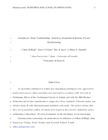Searching for moral dumbfounding: identifying measurable indicators of moral dumbfounding
Citation
McHugh, C., McGann, M., Igou, E. R., & Kinsella, E. L. (2017). Searching for Moral Dumbfounding: Identifying Measurable Indicators of Moral Dumbfounding. Collabra: Psychology, 3(1), 23.

View/
Date
2017Author
McHugh, Cillian
McGann, Marek
Igou, Eric R.
Kinsella, Elaine L.
Peer Reviewed
YesMetadata
Show full item record
McHugh, C., McGann, M., Igou, E. R., & Kinsella, E. L. (2017). Searching for Moral Dumbfounding: Identifying Measurable Indicators of Moral Dumbfounding. Collabra: Psychology, 3(1), 23.
Abstract
Moral dumbfounding is defined as maintaining a moral judgement, without supporting reasons. The most cited demonstration of dumbfounding does not identify a specific measure of dumbfounding and has not been published in peer-review form, or directly replicated. Despite limited empirical examination, dumbfounding has been widely discussed in moral psychology. The present research examines the reliability with which dumbfounding can be elicited, and aims to identify measureable indicators of dumbfounding. Study 1 aimed at establishing the effect that is reported in the literature. Participants read four scenarios and judged the actions described. An Interviewer challenged participants’ stated reasons for judgements. Dumbfounding was evoked, as measured by two indicators, admissions of not having reasons (17%), unsupported declarations (9%) with differences between scenarios. Study 2 measured dumbfounding as the selecting of an unsupported declaration as part of a computerised task. We observed high rates of dumbfounding across all scenarios. Studies 3a (college sample) and 3b (MTurk sample), addressing limitations in Study 2, replaced the unsupported declaration with an admission of having no reason, and included open-ended responses that were coded for unsupported declarations. As predicted, lower rates of dumbfounding were observed (3a 20%; 3b 16%; or 3a 32%; 3b 24% including unsupported declarations in open-ended responses). Two measures provided evidence for dumbfounding across three studies; rates varied with task type (interview/computer task), and with the particular measure being employed (admissions of not having reasons/unsupported declarations). Possible cognitive processes underlying dumbfounding and limitations of methodologies used are discussed as a means to account for this variability.
Keywords
MoralityDumbfounding
Judgement
Intuitions
Reasoning

